Em running
Page 28
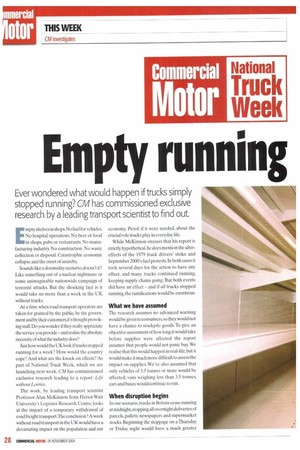
Page 29
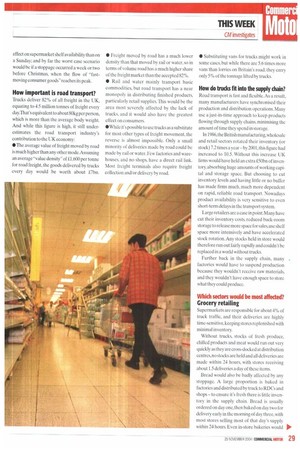
Page 30
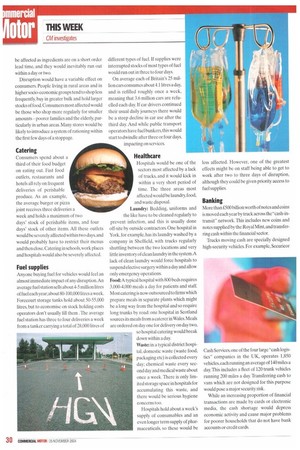
Page 31
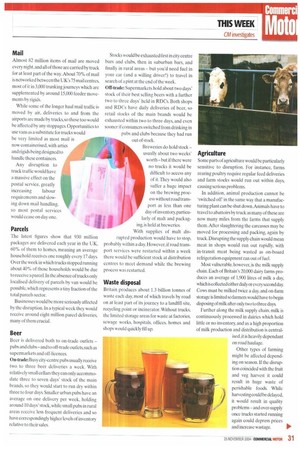
Page 32
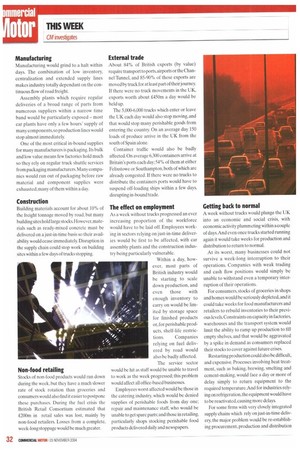
Page 33
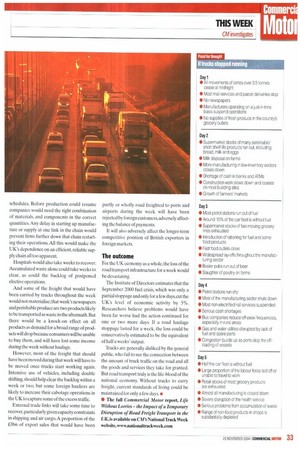
If you've noticed an error in this article please click here to report it so we can fix it.
Ever wondered what would happen if trucks simply stopped running? CM has commissioned exclusive research by a leading transport scientist to find out.
Empty shelves in shops. No fuel for vehicles No hospital operations. No beer or food in shops, pubs or restaurants. No manufacturing industry. No construction. No waste collection or disposal. Catastrophic economic collapse and the onset of anarchy.
Sounds like a doomsday scenario, doesn't it? Like something out of a nuclear nightmare or some unimaginable nationwide campaign of terrorist attacks. But the shocking fact is it would take no more than a week in the UK without trucks.
At a time when road transport operators are taken for granted by the public, by the government and by their customers, it's thought provoking stuff. Do you wonder if they really appreciate the service you provide —and realise the absolute necessity of what the industry does?
Just how would the UK look if trucks stopped running for a week? How would the country cope? And what are the knock-on effects? As part of National Truck Week, which we are launching next week, CM has commissioned exclusive research leading to a report: Life without Lorries.
The work, by leading transport scientist Professor Alan McKinnon from Heriot Watt University's Logistics Research Centre, looks at the impact of a temporary withdrawal of road freight transport.The conclusion? A week without road transport in the UK would have a devastating impact on the population and our economy. Proof, if it were needed, about the crucial role trucks play in everyday life.
While McKinnon stresses that his report is strictly hypothetical, he does mention the aftereffects of the 1979 truck drivers' strike and September 2000's fuel protests. In both cases it took several days for the action to have any effect, arid many trucks continued running, keeping supply chains going. But both events did have an effect — and if all trucks stopped running, the ramifications would be enormous.
What we have assumed
The research assumes no advanced warning would be given to consumers, so they would not have a chance to stockpile goods. To give an objective assessment of how long it would take before supplies were affected the report assumes that people would not panic buy. We realise that this would happen in real-life, but it would make it much more difficult to assess the impact on supplies. We've also assumed that only vehicles of 3.5 tonnes or more would be affected; vans weighing less than 3.5 tonnes, cars and buses would continue to run.
When disruption begins
In our scenario, trucks in Britain cease running at midnight,stopping all overnight deliveries of parcels, pallets, newspapers and supermarket stocks. Beginning the stoppage on a Thursday or Friday night would have a much greater effect on supermarket shelf availability than on a Sunday; and by far the worst case scenario would be if a stoppage occurred a week or two before Christmas, when the flow of -fastmoving consumer goods" reachesits peak.
How important is road transport?
Trucks deliver 82% of all freight in the UK, equating to 4.5 million tonnes of freight every day.That 's equivalent to about 80kg per person, which is more than the average body weight. And while this figure is high, it still underestimates the road transport industry's contribution to the UK economy: • The average value of freight moved by road is much higher than any other mode.Assuming an average "value density" of £1.600 per tonne for road freight, the goods delivered by trucks every day would be worth about £7bn. • Freight moved by road has a much lower density than that moved by rail or water, so in terms of volume road has a much higher share of the freight market than the accepted 82%.
• Rail and water mainly transport basic commodities, but road transport has a near monopoly in distributing finished products, particularly retail supplies. This would be the area most severely affected by the lack of trucks, and it would also have the greatest effect on consumers.
*While it's possible to use trucks as a substitute for most other types of freight movement, the reverse is almost impossible. Only a small minority of deliveries made by road could be made by rail or water. Few factories and warehouses. and no shops, have a direct rail link. Most freight terminals also require freight collection and/or delivery by road. • Substituting vans for trucks might work in some cases, but while there are 5.6 times more vans than lorries on Britain's road, they carry only 5% of the tonnage lifted by trucks.
How do trucks fit into the supply chain?
Road transport is fast and flexible. As a result, many manufacturers have synchronised their production and distribution operations. Many use a just-in-time approach to keep products flowing through supply chains, minimising the amount of time they spend in storage.
In 1986,the British manufacturing, wholesale and retail sectors rotated their inventory (or stock) 7.2 times a year -by 2001, this figure had increased to 10.5. Without this increase UK firms would have held an extra £50bn of inventory, absorbing huge amounts of working capital and storage space. But choosing to cut inventory levels and having little or no buffer has made firms much. much more dependent on rapid, reliable road transport. Nowadays product availability is very sensitive to even short-term delays in the transport system.
Large retailers are a case in point. Many have cut their inventory costs, reduced back-room storage to release more space for sales,use shelf space more intensively and have accelerated stock rotation. Any stocks held in store would therefore run out fairly rapidly and couldn't be replaced in a world without trucks.
Further back in the supply chain, many . factories would have to suspend production because they wouldn't receive raw materials, and they wouldn't have enough space to store what they could produce.
Which sectors would be most affected? Grocery retailing
Supermarkets are responsible for about 4% of truck traffic, and their deliveries are highly time-sensitive, keeping stores replenished with minimal inventory.
Without trucks, stocks of fresh produce, chilled products and meat would run out very quickly as they are cross-docked at distribution centres,no stocks are held and all deliveries are made within 24 hours, with stores receiving about 1.5 deliveries a day of these items.
Bread would also be badly affected by any stoppage. A large proportion is baked in factories and distributed by truck to RDCs and shops to ensure it's fresh there is little inventory in the supply chain. Bread is usually ordered on day one, then baked on day two for delivery early in the morning of day three, with most stores selling most of that day's supply within 24 hours. Even in-store bakeries would be affected as ingredients are on a short order lead time, and they would inevitably run out within a day or two.
Disruption would have a variable effect on consumers. People living in rural areas and in higher socio-economic groups tend to shop less frequently, buy in greater bulk and hold larger stocks of food. Consumers most affected would be those who shop more regularly for smaller amounts — poorer families and the elderly, particularly in urban areas. Many stores would be likely to introduce a system of rationing within the first few days of a stoppage.
Catering
Consumers spend about a third of their food budget on eating out. Fast food outlets, restaurants and hotels all rely on frequent deliveries of perishable produce. As an example, the average burger or pizza joint receives three deliveries a week and holds a maximum of two days' stock of perishable items, and four days' stock of other items. All these outlets would be severely affected within two days, arid would probably have to restrict their menus and then close. Catering in schools, work places and hospitals would also be severely affected.
Fuel supplies
Anyone buying fuel for vehicles would feel an almost immediate impact of any disruption.An average fuel station sells about 4-5 million litres of fuel each year:about 80-100.000 litres a week. Forecourt storage tanks hold about 50-55,000 litres, but to economise on stock holding costs operators don't usually fill them .The average fuel station has three to four deliveries a week from a tanker carrying a total of 28.000 litres of different types of fuel. If supplies were interrupted stocks of most types of fuel would run out in three to four days.
On average each of Britain's 25 million cars consumes about 4.1 litres a day, and is refilled roughly once a week, meaning that 3.6 million cars are refuelled each day. If car drivers continued their usual daily journeys there would be a steep decline in car use after the third day. And while public transport operators have fuel bunkers,this would start to dwindle after three or four days, impacting on services.
Healthcare
Hospitals would be one of the sectors most affected by a lack of trucks, and it would kick in within a very short period of time. The three areas most affected would be laundry, food, and waste disposal.
Laundry: Bedding, uniforms and the like have to be cleaned regularly to prevent infection, and this is usually done off-site by outside contractors. One hospital in York. for example, has its laundry washed by a company in Sheffield, with trucks regularly shuttling between the two locations and very little inventory of clean laundry in the system.A lack of clean laundry would force hospitals to suspend elective surgery within a day and allow only emergency operations.
Food:A typical hospital with 800 beds requires 3,000-4,000 meals a day for patients and staff. Most catering is now outsourced to firms which prepare meals in separate plants which might be a long way from the hospital and so require long trunks by road: one hospital in Scotland sources its meals from a caterer in Wales. Meals are ordered on day one for delivery on day two, so hospital catering would break down within a day.
Waste: in a typical district hospital, domestic waste (waste food, packaging etc) is collected every day: chemical waste every second day and medical waste about once a week. There is only limited storage space in hospitals for accumulating this waste, and there would be serious hygiene concerns too.
Hospitals hold about a week's supply of consumables and an even longer term supply of pharmaceuticals, so these would be less affected. However, one of the greatest effects might be on staff being able to get to work after two to three days of disruption, although they could be given priority access to fuel supplies.
Banking
More than £500 billion worth of notes and coins is moved each year by truck across the "cash-intransit" network. This includes new coins and notes supplied by the Royal Mint, and transferring cash within the financial sector.
Trucks moving cash are specially designed high-security vehicles. For example, Securicor Cash Services, one of the four large "cash logisticscompanies in the UK, operates 1,850 vehicles, each running an average of 140 miles a day. This includes a fleet of 120 trunk vehicles running 200 miles a day. Transferring cash to vans which are not designed for this purpose would pose a major security risk.
While an increasing proportion of financial transactions are made by cards or electronic media, the cash shortage would depress economic activity and cause major problems for poorer households that do not have bank accounts or credit cards.
Almost 82 million items of mail are moved every night.and all of those are carried by truck for at least part of the way. About 70% of mail is networked between the UK's 75 mail centres, most of it in 3,000 trunking journeys which are supplemented by around 15,000 feeder movements by rigids.
some of the longer haul mail traffic is moved by air, deliveries to and from the airports arc made by trucks, so these too would he affected by any stoppages. Opportunities to use vans as a substitute for trucks would be very limited as most mail is now containerised, with artics and rigids being designed to handle these containers.
Any disruption to truck traffic would have a massive effect on the postal service, greatly increasing labour requirements and slowing down mail handling, so most postal services would cease on day one.
Parcels
The latest figures show that 930 million packages are delivered each year in the UK, 60% of them to homes, meaning an average household receives one roughly every 17 days. Over the week in which trucks stopped running about 40% of those households would be due to receive a parcel. in the absence of trucks only localised delivery of parcels by van would be possible, which represents a tiny fraction of the total parcels sector.
Businesses would be more seriously affected by the disruption. In a typical week they would receive around eight million parcel deliveries. many of them crucial.
Beer
Beer is delivered both to on-trade outlets — pubs and clubs — and to off-trade outlets, such as supermarkets and off-licences.
On-trade: Busy city-centre pubs usually receive two to three beer deliveries a week. With relatively small cellars they can only accommodate three to seven days' stock of the main brands, so they would start to run dry within three to four days. Smaller urban pubs have an average on one delivery per week, holding around 10 days' stock, while small pubs in rural areas receive less frequent deliveries and so have correspondingly higher levels of inventory relative to their sales. Stocks would be exhausted first in city centre bars and clubs, then in suburban bars, and finally in rural areas — but you'd need fuel in your car (and a willing driver!) to travel in search of a pint at the end of the week. Off-trade: Supermarkets hold about two days' stock of their best selling beers with a further two to three days' held in RDCs. Both shops and RDCs have daily deliveries of beer, so retail stocks of the main brands would be exhausted within two to three days, and even sooner if consumers switched from drinking in pubs and clubs because they had run out of stock.
Breweries do hold stock — usually about two weeks' worth— but if there were no trucks it would be difficult to access any of it. They would also suffer a huge impact on the brewing process without road trans port as less than one day of inventory.particularly of malt and packaging, is held at breweries.
With supplies of malt dis rupted production would have to stop, probably within a day. However, if road transport services were restarted within a week there would be sufficient stock at distribution centres to meet demand while the brewing process was restarted.
Waste disposal
Britain produces about 1.3 billion tonnes of waste each day, most of which travels by road on at least part of its journey to a landfill site, recycling point or incinerator, Without trucks, the limited storage areas for waste at factories, sewage works, hospitals, offices, homes and shops would quickly fill up.
Agriculture
Some parts of agriculture would be particularly sensitive to disruption. For instance, farms rearing poultry require regular feed deliveries and farm stocks would run out within days. causing serious problems.
In addition, animal production cannot be 'switched off' in the same way that a manufacturing plant can be shut down.Animals have to travel to abattoirs by truck as many of these are now many miles from the farms that supply them. After slaughtering the carcasses may be moved for processing and packing. again by truck. Disrupting the supply chain would mean meat in shops would run out rapidly, with in-transit meat being wasted as on-board refrigeration equipment ran out of fuel.
Most vulnerable, however, is the milk supply chain. Each of Britain's 20.000 dairy farms produces an average of 1,900 litres of milk a day, which is collected either daily or every second day. Cows must be milked twice a day. and on-farm storage is limited so farmers would have to begin disposing of milk after only two to three days.
Further along the milk supply chain, milk is continuously processed in dairies which hold little or no inventory, and as a high proportion of milk production and distribution is centralised, it is heavily dependant on road haulage.
Other types of farming might be affected depending on season. If the disruption coincided with the fruit and veg harvest it could result in huge waste of perishable foods. While harvesting could be delayed, it would result in quality problems — and over-supply once trucks started running again could depress prices and increase wastage.
Manufacturing
Manufacturing would grind to a halt within days. The combination of low inventory. centralisation and extended supply lines makes industry totally dependant on the continuous flow of road freight.
Assembly plants which require regular deliveries of a broad range of parts from numerous suppliers within a narrow time band would be particularly exposed — most car plants have only a few hours' supply of many components, so production lines would stop almost immediately.
One of the most critical in-bound supplies for many manufacturers is packaging. Its bulk and low value means few factories hold much so they rely on regular truck shuttle services from packaging manufacturers. Many companies would run out of packaging before raw material and component supplies were exhausted: many of them within a day.
Construction
Building materials account for about 10% of the freight tonnage moved by road, but many building sites hold large stocks. However,materials such as ready-mixed concrete must be delivered on a just-in-time basis so their availability would cease immediately. Disruption in the supply chain could stop work on building sites within a few days of trucks stopping.
Non-food retailing
Stocks of non-food products would run down during the week, but they have a much slower rate of stock rotation than groceries and consumers would also find it easier to postpone these purchases. During the fuel crisis the British Retail Consortium estimated that £200m in retail sales was lost, mainly by non-food retailers. Losses from a complete, week-long stoppage would be much greater.
External trade
About 84% of British exports (by value) require transport to ports, airports or the Channel Tunnel, and 85-90% of these exports are moved by truck for at least part of their journey. If there were no truck movements in the UK, exports worth about £450m a day would be held up.
The 5,000-6,000 trucks which enter or leave the UK each day would also stop moving, and that would stop many perishable goods from entering the country. On an average day 150 loads of produce arrive in the UK from the south of Spain alone.
Container traffic would also be badly affected. On average 6,300 containers arrive at Britain's ports each day: 54% of them at either Felixstowe or Southampton. both of which are already congested. If there were no trucks to distribute the containers ports would have to suspend off-loading ships within a few days, disrupting in-bound trade.
The effect on employment
As a week without trucks progressed an ever increasing proportion of the workforce would have to be laid off. Employees working in sectors relying on just-in-time deliveries would be first to be affected, with car assembly plants and the construction industry being particularly vulnerable.
Within a day, however, most parts of British industry would be starting to scale down production, and even those with enough inventory to carry on would be limited by storage space for finished products or, for perishable products, shelf-life restric tions. Companies relying on fuel delivered by road would also be badly affected.
The service sector would be hit as staff would be unable to travel to work as the week progressed; this problem would affect all office-based businesses.
Employees worst affected would be those in the catering industry, which would be denied supplies of perishable foods from day one; repair and maintenance staff, who would be unable to get spare parts: and those in retailing, particularly shops stocking perishable food products delivered daily and newspapers.
Getting back to normal
A week without trucks would plunge the UK into an economic and social crisis, with economic activity plummeting within a couple of days. And even once trucks started running again it would take weeks for production and distribution to return to normal.
At its worst, many businesses could not survive a week-long interruption to their operations. Companies with weak trading and cash flow positions would simply be unable to withstand even a temporary interruption of their operations.
For consumers, stocks of groceries in shops and homes would be seriously depleted, and it could take weeks for food manufacturers and retailers to rebuild inventories to their previous levels. Constraints on capacity in factories, warehouses and the transport system would limit the ability to ramp up production to fill empty shelves, and that would be aggravated by a spike in demand as consumers replaced their stocks to cover against future crises.
Restarting production could also be difficult, and expensive. Processes involving heat treatment, such as baking, brewing, smelting and cement-making, would face a day or more of delay simply to return equipment to the required temperature. And for industries relying on refrigeration.the equipment would have lobe reactivated.causing more delays.
For some firms with very closely integrated supply chains which rely on just-in-time delivery, the major problem would be re-establishing procurement, production and distribution schedules. Before production could resume companies would need the right combination of materials, and components in the correct quantities. Any delay in starting up manufacture or supply at one link in the chain would prevent firms further down that chain restarting their operations. All this would make the UK's dependence on an efficient, reliable supply chain all too apparent.
Hospitals would also take weeks to recover. Accumulated waste alone could take weeks to clear, as could the backlog of postponed elective operations.
And some of the freight that would have been carried by trucks throughout the week would not materialise; that week's newspapers and perishable produce are two products likely to be transported as waste in the aftermath. But there would be a knock-on effect on all products as demand for a broad range of products will drop because consumers will be unable to buy them, and will have lost some income during the week without haulage.
However, most of the freight that should have been moved during that week will have to be moved once trucks start working again. Intensive use of vehicles, including double shifting, should help clear the backlog within a week or two, but some foreign hauliers are likely to increase their cabotage operations in the UK to capture some of the excess traffic.
External trade links will take some time to recover, particularly given capacity constraints in shipping and air cargo. A proportion of the £3bn of export sales that would have been partly or wholly road freighted to ports and airports during the week will have been rejected by foreign customers.adversely affecting the balance of payments.
It will also adversely affect the longer-term competitive position of British exporters in foreign markets.
The outcome
For the UK economy as a whole, the loss of the road transport infrastructure for a week would be devastating.
The Institute of Directors estimates that the September 2000 fuel crisis, which was only a partial stoppage and only bra few days, cut the UK's level of economic activity by 5%. Researchers believe problems would have been far worse had the action continued for one or two more days. If a road haulage stoppage lasted for a week, the loss could be conservatively estimated to be the equivalent of half a weeks' output.
Trucks are generally disliked by the general public, who fail to see the connection between the amount of truck traffic on the road and all the goods and services they take for granted. But road transport truly is the life-blood of the national economy. Without trucks to carry freight, current standards of living could be maintained for only a few days. • • The full Commercial Motor report, Life Without Lorries the Impact of a Temporary Disruption of Road Freight Transport in the UK,is available on CM'S National Truck Week website, www.nationahruckweek.com
























































































































































































